- Home
- Madeleine L'engle
The Summer of the Great-Grandmother Page 2
The Summer of the Great-Grandmother Read online
Page 2
After the first two wakeful nights it is clear to me how competent they are, and that I must get some rest.
It’s a good thing to have all the props pulled out from under us occasionally. It gives us some sense of what is rock under our feet, and what is sand. It stops us from taking anything for granted. It has also taught me a lot about living in the immediate moment. I am somehow managing to live one day, one hour at a time. I have to. Hugh is in Crosswicks for four days, and somehow or other I am able simply to be with him, without projecting into the future. When he goes back to New York he will be going to the neurologist.
Each evening after dinner I walk the dogs down the lane for a few minutes, to catch my breath and regain perspective. The girls prepare the great-grandmother for bed, and we learned the first night that this is done more easily if I am out of the house; if I am there she calls for me, and will not do anything for any of us.
This night, when I return, she has been put to bed, and the larger family—Hugh, Bion, Josephine, the girls, assorted friends and neighbors (Maria and Peter are not back from their honeymoon)—have gathered in the living room to play poker with ancient poker chips. Alan is out in the Tower writing. I’m not a poker player either, so I go in to say good night to Mother and sit with her for a while. Our quiet times together have always been in the morning, over coffee, and at night before bedtime. For a moment, a flash, she is there, is herself, and we laugh at Tyrrell lying on her back, all four legs spread out, tail wagging in this upside-down position. Thomas, the amber cat; is also on his back, lying beside the big dog, rear legs abandoned, fore-paws folded prayerfully across his chest. Titus, the yellow puffball kitten, is in Mother’s lap, purring.
Then the moment is gone. “Something’s wrong,” my mother says. “I don’t know what it is, but something’s wrong.”
“It’s all right, Mother. Nothing is wrong.”
“It is, it is. Something’s wrong. I want to go home.” This has been a constant refrain since her arrival. “I want to go home. I want to go home.”
“You are home, Mother. You’re with your family, with all your children.”
“I want to go home.”
Yesterday Alan put his arms around me to give me comfort, and said, “Yes, she wants to go home, but she doesn’t mean down South.”
Her fear touches off an enormous wave of protectiveness in me, and I know no way to keep her terror at bay.
“I want to go home,” she repeats.
I sit on the bed beside her, and hold her hand. She fumbles with the other hand for the bell we have rigged up for her. A summer ago she used it sparingly; this summer it seems that the raucous buzz goes off every few minutes. “Mother, you don’t need to ring for the girls. I’m right here.”
“Where are they?”
“In the living room.”
“What are they doing?”
“Playing poker.”
She reaches again for the bell.
“Don’t call them, Mother. I’m right here.” I am obviously a poor substitute. Why am I hurt? This is not my mother who is rejecting me, my mother who was always patient, tolerant, wise.
Then she turns toward me, reaches for me. “I’m scared. I’m scared.”
I put my arms around her and hold her. I hold her as I held my children when they were small and afraid in the night; as, this summer, I hold my grandchildren. I hold her as she, once upon a time and long ago, held me. And I say the same words, the classic, maternal, instinctive words of reassurance. “Don’t be afraid. I’m here. It’s all right.”
“Something’s wrong. I’m scared. I’m scared.”
I cradle her and repeat, “It’s all right.”
What’s all right? What am I promising her? I’m scared too. I don’t know what will happen when Hugh goes to the neurologist. I don’t know what’s going to happen with my mother this summer. I don’t know what the message may be the next time the phone rings. What’s all right? How can I say it?
But I do. I hold her close, and kiss her, and murmur, “It’s all right, Mother. It’s all right.”
I mean these words. I do not understand them, but I mean them. Perhaps one day I will find out what I mean. They are implicit in everything I write. I caught a hint of them during that lecture, even as I was cautioning against false promises. They are behind everything, the cooking of meals, walking the dogs, talking with the girls. I may never find out with my intellectual self what I mean, but if I am given enough glimpses perhaps these will add up to enough so that my heart will understand. It does not; not yet.
When Mother is quiet and moving into sleep, I go up to bed. Hugh’s and my room is directly over hers. If any architect of theatre or concert hall wants to study acoustics, all he needs to do is come to Crosswicks. A pin dropped at one end of the house can be heard in the other. Bion’s room is up in the attic, over ours. If he plays music up there at night, a loudspeaker might as well be concealed in one of the heavy, pineappled posts of our big bed. If I can hear Bion, Mother can hear me. I tiptoe very softly, very carefully.
But it works two ways. Mother can hear any sound from our bedroom. I can also hear her.
The poker players disperse. The household settles down for the night. Cynthia brings me a mug of cocoa with whipped cream and a marshmallow. I thank her, saying, “This will put me to sleep.”
Cynthia goes into the next room, the nursery, where she sleeps with the two little girls. Her father is one of the canons at the Cathedral in New York, and ever since Léna made my mother a great-grandmother, Cynthia has spent at least part of the summer with us, helping with the children.
I sip the hot cocoa, but it does not put me to sleep. When the rest of the house is quiet, I am still awake, listening for every sound downstairs. I hear Mother turn over, call out. She sounds frightened. I know that I mustn’t keep rushing downstairs at her least sound, but I get halfway out of bed, listening, listening. I go out into the hall and stand by the stairs. But there is no further sound. I go back to bed and turn on the light to read and wait for Hugh, who will be reading downstairs for a while in order not to disturb me.
I have found that the German philosophers with their long, cumbersome sentences (never use three words when you can use a hundred and three) are soporific. It is seldom that I can read Kant for more than half an hour without my eyelids drooping. After a while I turn off the light, but I am still sleeping with one ear open as I did when the children were little, listening for Mother, for the grandbabies, waiting for Hugh.
I sit up in bed: what is that?
It is Bion, climbing up the blue spruce and in through the nursery window so as not to disturb his grandmother by coming in downstairs. He and some of the poker players have been for a midnight swim at Mohawk Pond. He stands in the doorway between nursery and bedroom to talk. I hold my fingers to my lips, not for Cynthia and the babies, who are sound asleep, but for his grandmother.
We planted the blue spruce before he was born. By the time he was a baby, it was big enough for us to use for our outdoor Christmas tree; it could be seen from the main road, a mile downhill, and we always turned it on to welcome Hugh on his way home. The last Christmas we spent at Crosswicks before moving back to New York for the school year, I had to stand on the kitchen step stool, on tiptoe, to fling the string of lights over the top branches. Now the tree is as tall as the house, and Bion can use it for his private, if prickly, stairway.
We whisper for a while, and then he says, “Go to sleep, Mother.”
To sleep, perchance to dream.
I love my dreams, and the good ones are so good that they more than compensate for the occasional bad ones, when I wake up and reach out to touch my sleeping husband for comfort. In the past few years my mother has moved slowly into the realm of nightmare; her dreams are frightening; they are controlled and distorted by clogged arteries. She has never slept well, but now she is becoming afraid to sleep.
I hear Bion tramping up the stairs to his attic bedroom. From her crib
Charlotte gives a dream cry. There is no sound at all from Mother’s room. I must try to sleep.
5
On Monday, Hugh goes down to New York; to the television studio; to the neurologist. All day I am conscious of the telephone. Waiting. Of course it is one day when all kinds of people phone, and although I know that Hugh will not call before late afternoon, my heart jolts with each ring.
The day moves slowly. The children blow dandelion clocks, and their white stars seed the lawn: Hugh will be furious. The sun seems to hold still in the sky. But there are things to do, meals to cook, beds to be made, small duties which push the day along. When the phone rings and I hear Hugh’s voice, the timbre strong and vibrant, I know that the news is good. The numbness in the feet is caused by diabetes, is controllable. If I had not been worried about a brain tumor I might have been horribly upset, but we have known about the mild diabetes for over a year; I have already learned how to cook without sugar; all I feel is lightness with the weight of my worst fears removed. I soar like one of the butterflies the children and the puppies love to chase across the big field.
Now that the sword of Damocles has been lifted from our heads, and there’s a hope of a future together, I still must neither count on nor fear that future, but live in the present moment, the now. And I must turn my heart fully to Mother, and not let it be torn too much by her infinitely pathetic degeneration. I must not retreat when she is horrid with me, but let it roll off—almost impossible, but I will try. And I must not project into the future and worry about this descent being a long one.
It has not come all at once; there were strong intimations of it more than five years ago, at the time of Josephine and Alan’s wedding; and it was definitely accelerated when Mother was given general anesthesia for an intestinal resection when she was eighty-seven. But until this year her mind has been like a summer sky with small white clouds occasionally moving across and blotting out the light of the sun. Each year the sky has become cloudier; there have been fewer periods of sunlight. This summer the sunlight in the sky of my mother’s mind, when it shines at all, glimmers through cloud.
Maria and Peter come back from their honeymoon. They are based in Peter’s apartment in Philadelphia, where he has been doing post-doctoral work at the University of Pennsylvania, but they come frequently to Crosswicks.
The best part of these slow, long summer days, so different from the rest of the year, is early evening and dinnertime, when the family gathers together after the day’s work, the noisy, extreme, diverse people who keep me going. I get dinner started, and then we all sit in the living room for an hour. The little girls are already fed, bathed, and in their nightclothes; like the puppies and the cats they wander around looking for cuddles and cookies. Léna likes to choose what I am to wear; I enjoy, if there’s time, taking a hot, soaky bath, then putting on a long dress or skirt. Léna points to the clothes in my closet: “Dis one, Gan-mad-len.”
Gan-mad-len. Her attempt at Grandmadeleine. Charlotte cannot get that far. I am Madden. Neither of the little girls can get her tongue around Great-grandmother, and Léna comes up with Gracchi, which sticks. How to spell it? It sounds something halfway between Grokkie and Grakkie, and Gracchi is as close as I can get to what it sounds like to me. Sometimes Mother is aware enough to be charmed by her new title.
Josephine, too, enjoys a bath and a change of clothes before dinner. Maria wears low-waisted, bell-bottom trousers, which are most becoming to her.
As for the men; Hugh comes in from his vegetable garden wearing frayed shorts made out of an old pair of trousers, and honest sweat. He doesn’t call his garden organic, or macrobiotic; he simply gardens the way the first dwellers in Crosswicks gardened, with manure and compost, and no chemical sprays or powders. He brings lettuces and tomatoes and young onions and carrots and peppers and the first small cauliflower into the kitchen and sits down, tired and contented. I make a sauce, and we take the young, raw vegetables into the living room for hors d’oeuvres.
Alan has on a purple, Russian-necked shirt, and comes in from the kitchen bearing freshly made hot clam dip. Peter looks, as usual, like Einstein, hair and all. Bion has been out painting fences all day, and wears jeans and a large quantity of white paint. This is a summer of transition for him, this time between school and college, and it is the first summer since he started high school that he hasn’t been away from home for at least a month on some job or other. It is good to have him around, and he has enough painting jobs to keep him busy. He puts a record on the player and drapes six foot four inches of young man over a large chair.
Margie and Cynthia come in with the great-grandmother between them, and settle her on the small sofa. Margie’s family lives up the road from us, and one of Margie’s older sisters babysat for us when Margie herself was a baby. Margie and Cynthia; Vicki and Janet; Clara, our friend and neighbor from down the road; Bion’s friend, Jane, who comes to take the long weekend duty to give the others a break; Polly, from across the lane: it’s a multiple job for all of them. They help with the great-grandmother; help with the babies; help with the dishes and housecleaning; everybody pitches in. Cynthia bakes cakes—my cooking falls down when it comes to pastry. Margie cleans and polishes everything and keeps the house full of flowers from the garden, from fields and hedges. This used to be my mother’s job; it is something else old age has taken away from her; and from us.
Clara, older, stronger, more experienced than the girls, picks the great-grandmother up nearly every morning and puts her in the bathtub; brushes her still-beautiful hair; dispenses love generously wherever it is needed. The girls bring laughter and music and life. These extraordinary helpers are all ordinary, everyday people, and I couldn’t get along without them.
I realize, with a pang, how privileged we are to be able to keep my mother with us. This is how it should be, but what would I do if we lived in a tiny house and did not have the girls and Clara to help? Would I be able to keep her with us, or would I have to put her in a “home”—what an obscene misuse of a word! Homes for the aged, nursing homes, are one of the horrors of our time, but for many people there is no alternative. And even though we have room, and the girls to help us, there are still those who think that my mother should be put away. Put away. Everything in me revolts at the thought. But my belief that we are supposed to share all of life with each other, dying and decay as well as feasting and fun, is being put to the test.
This summer I look at my mother sitting on the small sofa during the hour before dinner and I do not know her; I am looking at a stranger, not because she is old and shrunken and lined, but because the light behind her face is no longer there. Up until a few years ago she was an example of a woman who has experienced life fully, and who grows yearly more beautiful with age. There is little character or loveliness in the face of someone who has avoided suffering, shunned risk, rejected life. It was only when suffering, risk, and life were taken from her by atherosclerosis that Mother’s face became an unfamiliar one. (I asked Pat, “What do you call it? Arteriosclerosis? Atherosclerosis?” “Most lay people say arterio, but it’s athero.”)
A house, like a human being, reflects its experiences. And I do not think that a house can be a happy house if no one has cried in it, if no one has died in it. If this seems contradictory, I can’t help it. I rebel against death, yet I know that it is how I respond to death’s inevitability that is going to make me less or more fully alive. The house helps me here, because it is a warm and welcoming house, full of life, and yet during the past two hundred years it must have contained many deaths.
Death is the most ordinary thing in the world, and so is birth. Someone is being born at this very moment. Someone is dying. Ordinary, and yet completely extraordinary. The marvel of having my babies is something I will never forget. The feeling of staggering uniqueness I had at the death of my father, the death of several close friends, was very different, but equally acute. Death may be an ordinary, everyday affair, but it is not a statistic. It is something
that happens to people.
The most ordinary of deaths is the death of a parent. In this twentieth century we are likely to outlive our mothers and fathers, and more parents are dying senile than ever before. Perhaps this is why old age is respected less. So what I am experiencing this summer (though our doctor tells us that Mother is far from dying) is something I share with a great many other people. And I feel the need to reach out and say, “This is how it is for me. How is it for you?”
6
Tallis returns from his vacation in England and phones. “How goes it?” He can tell by my voice that the going is rough, and his response is to drive himself right up in his ancient Thunderbird. His own mother died not long ago at ninety-three; he does not need to say anything, nor do I; I know that he knows.
Everybody in Great-grandmamá’s retinue enjoys him; long after I have gone to bed they sit around the dining-room table, by candlelight, talking deep into the night.
Sometimes Tallis drives up with our mutual friend, whom we call Anton, because of his resemblance to Chekhov. When Mother first saw Anton with his Chekhovian beard, she announced in a loud clear voice that it was horrible. “I hate it. But you may kiss me anyhow.”
Anton, like Tallis, is horrified at the changes in the great-grandmother. Only a summer ago we all sat at the dinner table and laughed while Anton refused to pass the old lady a seventh ear of freshpicked corn—“I don’t know how I ever dared try to stop her,” he said. Only a year ago we all literally almost fell off our chairs with laughter when Anton complimented me on dinner and Mother commented, “It ought to be good. I’ve taught Madeleine everything she knows about cooking.” Somehow or other, even through the Depression, Mother almost always managed to have someone in the kitchen. Now, when she is at home in the South, she has an entire retinue, so that she is cooked for and cared for seven days a week.

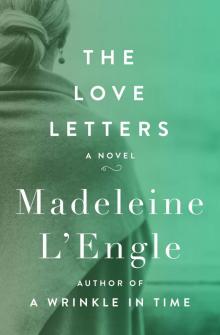 Love Letters
Love Letters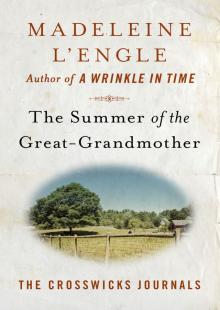 The Summer of the Great-Grandmother
The Summer of the Great-Grandmother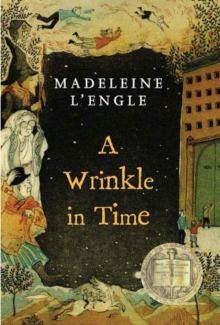 A Wrinkle in Time
A Wrinkle in Time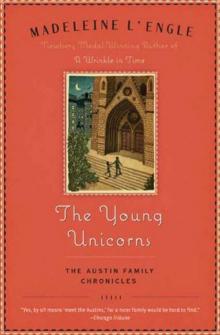 The Young Unicorns
The Young Unicorns Two-Part Invention: The Story of a Marriage
Two-Part Invention: The Story of a Marriage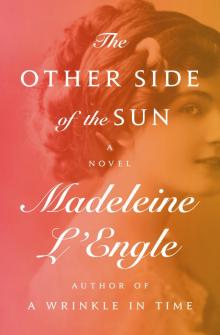 The Other Side of the Sun
The Other Side of the Sun A House Like a Lotus
A House Like a Lotus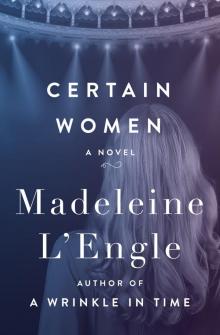 Certain Women
Certain Women Many Waters
Many Waters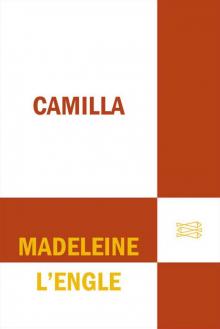 Camilla
Camilla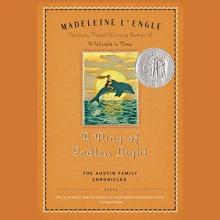 A Ring of Endless Light
A Ring of Endless Light Meet the Austins
Meet the Austins Dragons in the Waters
Dragons in the Waters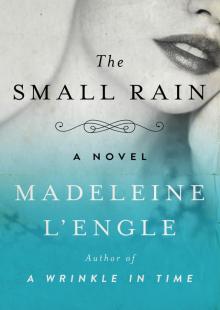 The Small Rain
The Small Rain The Moment of Tenderness
The Moment of Tenderness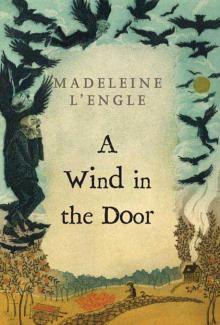 A Wind in the Door
A Wind in the Door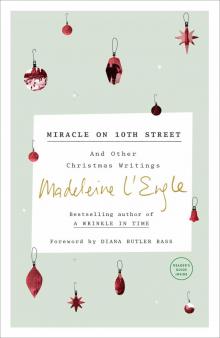 Miracle on 10th Street
Miracle on 10th Street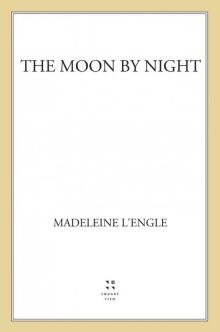 The Moon by Night
The Moon by Night A Swiftly Tilting Planet
A Swiftly Tilting Planet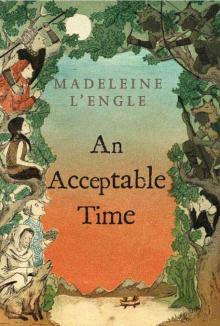 An Acceptable Time
An Acceptable Time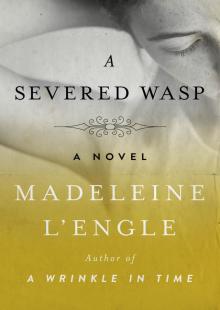 A Severed Wasp
A Severed Wasp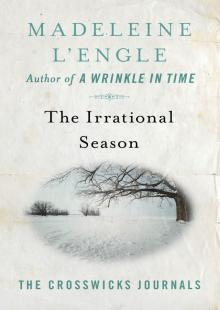 The Irrational Season
The Irrational Season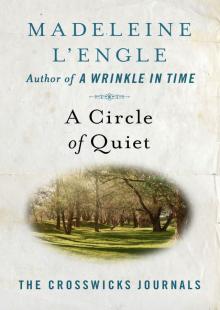 A Circle of Quiet
A Circle of Quiet A Live Coal in the Sea
A Live Coal in the Sea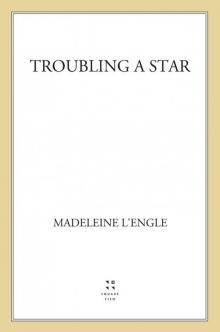 Troubling a Star
Troubling a Star Walking on Water: Reflections on Faith and Art
Walking on Water: Reflections on Faith and Art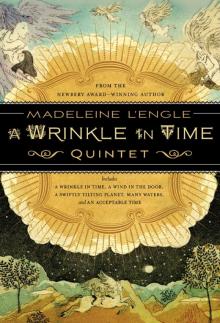 A Wrinkle in Time Quintet
A Wrinkle in Time Quintet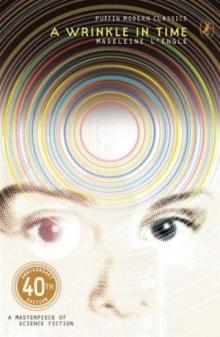 Wrinkle in Time
Wrinkle in Time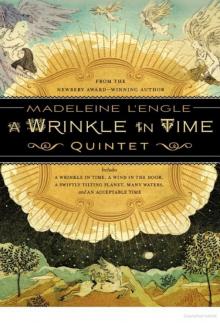 The Wrinkle in Time Quintet
The Wrinkle in Time Quintet Intergalactic P.S. 3
Intergalactic P.S. 3 Walking on Water
Walking on Water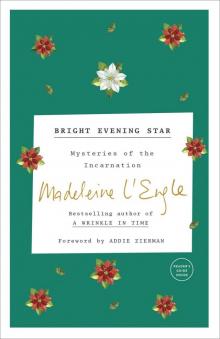 Bright Evening Star
Bright Evening Star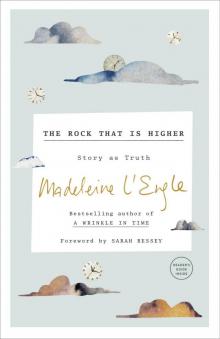 The Rock That Is Higher
The Rock That Is Higher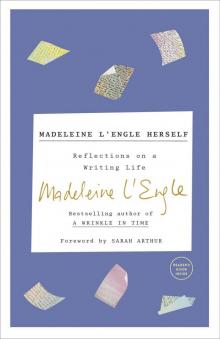 Madeleine L'Engle Herself
Madeleine L'Engle Herself The Arm of the Starfish
The Arm of the Starfish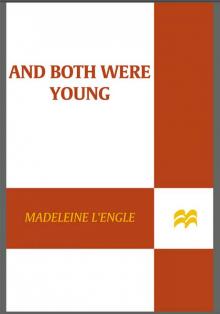 And Both Were Young
And Both Were Young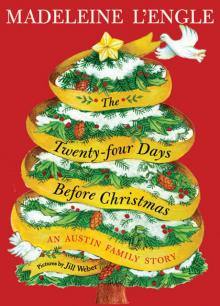 The Twenty-four Days Before Christmas
The Twenty-four Days Before Christmas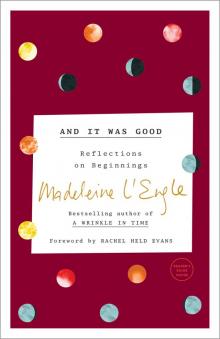 And It Was Good
And It Was Good A Stone for a Pillow
A Stone for a Pillow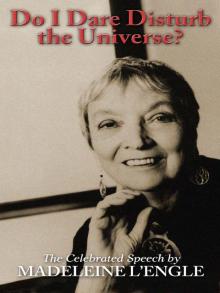 Do I Dare Disturb the Universe?
Do I Dare Disturb the Universe?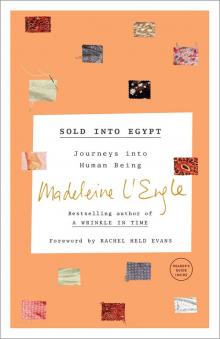 Sold into Egypt
Sold into Egypt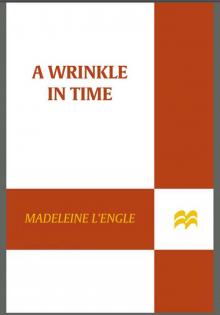 A Wrinkle in Time (Madeleine L'Engle's Time Quintet)
A Wrinkle in Time (Madeleine L'Engle's Time Quintet)